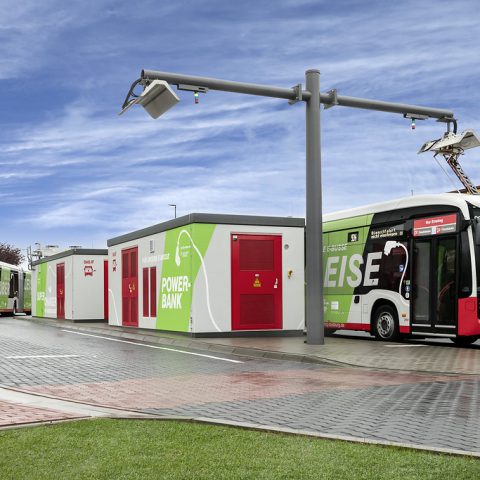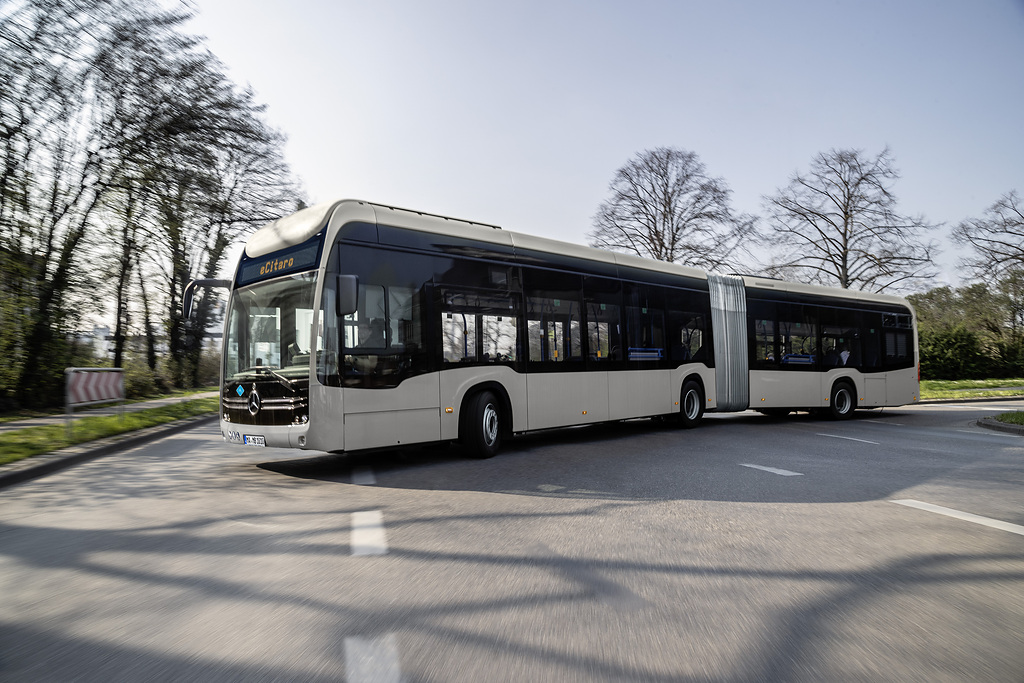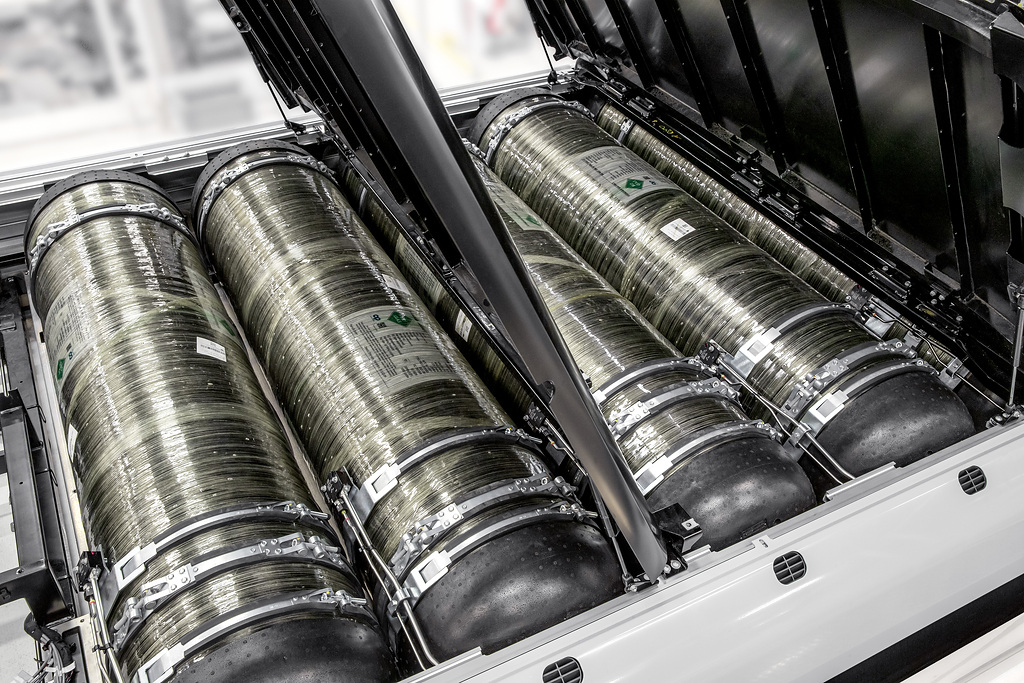Daimler to sell only zero emission city buses in Europe starting in 2030 (eCitaro with Toyota fuel cell range extender ready next year)
Daimler Buses aims to offer zero emission buses in every segment by 2030 (both battery and hydrogen-powered). Starting in 2023, the Mercedes eCitaro will be also equipped with a hydrogen-based fuel cell as a range extender. The first full electric intercity bus will be launched in 2025. The fuel cell of the Mercedes eCitaro Range […]

Daimler Buses aims to offer zero emission buses in every segment by 2030 (both battery and hydrogen-powered). Starting in 2023, the Mercedes eCitaro will be also equipped with a hydrogen-based fuel cell as a range extender. The first full electric intercity bus will be launched in 2025.
The fuel cell of the Mercedes eCitaro Range Extender comes from Toyota and is in its second generation. It is a heavy-duty unit with a maximum output of 60 kW.
Daimler Buses states it is not investing in Euro VII in Class I buses and forecasts a share of 75% of e-buses in public transport in the EU by 2030.
Daimler Buses in Europe, only zero emission city buses in 2030
In addition to expanding its portfolio of zero emission buses, Daimler Buses is also expanding its service offerings as a general contractor for customers’ complete electric infrastructure. This was announced today by Till Oberwörder, Head of Daimler Buses, at an event held by the manufacturer at its Mannheim site. Speakers also included Martin Daum, Chairman of the Board of Management of Daimler Truck, and Dr. Volker Wissing, Federal Minister for Digital and Transport.
The initial focus for Daimler Truck electrification strategy will be on the core markets of Europe and Latin America. By 2039, only locally CO2-neutral new vehicles are to be sold in the core market of Europe, as already announced. In the city bus segment, only zero emission buses are to be sold already in 2030.

Daimler zero emission buses for intercity in 2025
Daimler Buses plans to launch the first all-electric inter-city bus from 2025 and coaches with hydrogen-based fuel cell drive from the end of this decade. In line with the dual-track strategy of its parent company Daimler Truck, Daimler Buses is focusing on both battery-electric and hydrogen-based technologies – because this is the only way to offer tailored zero-emission solutions for the diverse needs of its customers, the group says.
Focus on the eCitaro with fuel cell range extender
The eCitaro Range Extender is still clearly designed for use as a city bus. The drive system continues to be based on the very powerful battery, while the fuel cell serves purely to extend the range and not as the main energy source. The vehicle is thus an all-electric hybrid bus that combines both power sources. The hydrogen is used in gaseous form at a pressure of 350 bar.
In addition, Daimler Buses will offer the eCitaro with a new generation of high-performance batteries from the end of 2022. The high-energy lithium-ion batteries increase the capacity per battery cell by around 50 percent for the same weight and enable reliable ranges of around 280 kilometers (solo bus). The batteries will be used in both the eCitaro, the eCitaro Range Extender and the recently launched all-electric chassis eO500U from Brazil, the group points out.
Till Oberwörder, Head of Daimler Buses: “As a worldwide leading bus manufacturer, our ambition is clear: We want to make a contribution to contending climate change and be a driver of the change in transportation that is needed to achieve this. To this end, we are pursuing a clear electrification strategy and putting buses with alternative drive technologies on the road in series production. We want to offer locally CO2-neutral powertrains for each of our segments in our most important markets by 2030 and therefore make a clear commitment: from 2030 at the latest, we will only offer CO2-neutral new vehicles in the city bus segment in Europe and will not invest in Euro VII technology. We are focusing our development efforts entirely on the zero-emission and fully electrically powered eCitaro.”
Oberwörder continued, “We take a holistic view of electrification and go far beyond the vehicle itself. We supply our customers with electric mobility on a ‘turnkey’ basis, which means they get from us all the modules they need for a functioning electric bus service: We supply the buses, we plan the necessary infrastructure as well as the charging management, we manage the conversion of the depot and we train the staff. Our goal is for electro mobility to become an everyday reality in the bus business.”
Dr. Volker Wissing, Federal Minster for Digital and Transport: “To achieve our climate goals, we need more zero-emission vehicles. We actively support public transport companies to decarbonise their fleets and provide them with the corresponding infrastructure. We have earmarked a total of 1.25 billion Euro for this purpose. Our goal: by 2030, every second city bus should be electrified.”

Mercedes eCitaro sold as a system
Daimler Buses underlines that it offers its customers a complete system for the all-electric eCitaro, which includes project planning and consulting services for the smooth operation of an electric fleet as well as the complete construction of the power supply infrastructure. This also includes the corresponding construction measures, which are offered on a turnkey basis if required. On request, transport companies can thus obtain a coordinated overall package comprising bus, power and charging infrastructure as well as suitable software, digital services, appropriate training for staff and aftersales from a single source.
In particular, the charging management of battery-electric buses is crucial for smooth everyday operations for customers. Here, thanks to the recently announced strategic partnership with IVU Traffic Technologies AG, Daimler Buses has supplemented its portfolio with powerful fleet control software specifically tailored to the eCitaro with regard to charging management.







